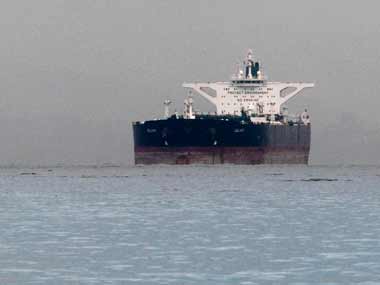Oil prices retreated on Tuesday as data showing a shrinking euro zone economy fueled fears of curbed demand for petroleum, while news that major powers accepted Iran’s offer for more talks on its nuclear program eased concerns about supply disruptions.
Oil, global equities and the euro came under pressure from worries about a global growth slowdown and uncertainty over whether enough investors would participate in a Greek debt restructuring to enable it to avert a default.
The EU’s foreign policy chief, representing six powers – the United States, Russia, China, France, Britain and Germany – wrote to Iran’s chief nuclear negotiator accepting an offer to meet to discuss Tehran’s nuclear program.
[caption id=“attachment_236805” align=“alignleft” width=“380” caption=“Iranian crude oil supertanker “Delvar” is seen anchored off Singapore. Reuters”]  [/caption]
Also helping ease investor fears of oil supply disruption because of the tensions over its nuclear program, Tehran said it would give the U.N.’s International Atomic Energy Agency (IAEA) access to Parchin, a military complex previously off-limits to IAEA nuclear inspectors.
“The risk premium on Iran was pretty high, so one should expect to see that fading because world powers are willing to talk to Iran,” said Olivier Jakob, an analyst at Petromatrix in Zug, Switzerland.
Brent crude fell $1.50 to $122.30 a barrel at 1:10 p.m. EST. Brent’s $121.59 intraday low was just above of the 20-day moving average at $121.32.
U.S. crude dropped $1.90 to $104.82 a barrel, with the $104.51 low just above the 20-day moving average of $104.22.
Intensified sanctions, including a European Union ban on importing Iranian oil slated for July, Iran’s threats to retaliate by shutting the Strait of Hormuz shipping lane, and other potential threats to supply have helped keep crude prices elevated.
Brent was up more than 19 percent for the year at its 2012 peak above $128 a barrel last week.
The dollar index .DXY strengthened more than a half percent and the euro slumped against the U.S. currency to its lowest in more than two weeks on the mounting concerns about global economic growth.
The European Union data showing the economy in the euro zone shrank 0.3 percent in fourth-quarter 2012 followed Monday’s news that China cut its 2012 economic growth target to an eight-year low of 7.5 percent, reinforcing worries about curbed oil demand growth.
Additional reinforcement followed when the U.S. Energy Information cut its world oil demand growth forecasts for both 2012 and 2013.
Copper joined in the commodities slump and fell to a two-week low as the stronger dollar and worries about slower growth in top consumer China brought pressure on the key industrial feedstock.
Investors await data on China’s industrial output, investment and retail sales and the closely watched monthly U.S. non farm payrolls report, both due on Friday, for a fresh snapshot of the world’s two largest economies.
Reuters


)
)
)
)
)
)
)
)
)



